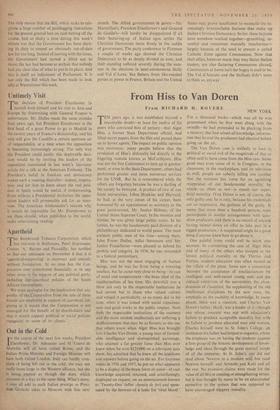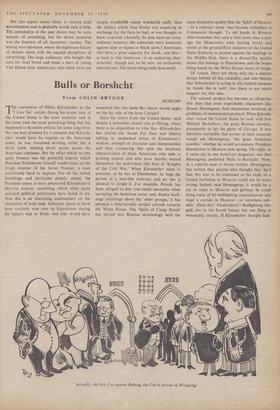From Hiss to Van Doren
Front RICHARD H. ROVERE NEW YORK
TEN years ago, it was established beyond a reasonable doubt—at least for twelve of his peers who convicted him of perjury—that Alger Hiss, a former State Department official, had lifted secret papers from the files and passed them on to Soviet agents. The impact on public opinion was enormous; many people believe that the revelation of Hiss's disloyalty led directly to the lingering malaise known as McCarthyism. Hiss was not the first Communist to turn up in govern- ment, or even in the State Department; others had performed greater and more numerous services for the USSR. But he is remembered while the others are forgotten because he was a darling of, the society he betrayed. A product of two of our finest universities, Johns Hopkins and Harvard, he had, at the very outset of his career, been honoured by an appointment as secretary to the great jurist-savant, Mr. Justice Holmes, of the United States Supreme Court. In his twenties and thirties, he was given large public trusts. In his forties, he was the handsomely paid director of a philanthropy dedicated to world peace. The most eminent public men of his time—among them, John Foster Dulles, Adlai Stevenson and Mr. Justice Frankfurter—were pleased to defend his probity and integrity. In 1950, he was remanded to a federal penitentiary.
Hiss was not the most engaging of human beings, and he was far from being a towering intellect, but he came very close to being—in cast of mind and temperament—the beau ideal of the intellectualism of his time. His downfall was a blow not only to the respectable institutions he had served but to those who 'valued culture and valued it particularly, as so many did in his time, when it was joined with social conscious- ness and good works in the public interest. Now both the respectable institutions of the moment and the more modish intellectuals are suffering a disillusionment that may be as historic as the one that others knew when Alger Hiss was brought low. Charles Van Doren. a young man of formid- able intelligence and distinguished parentage, who attained a far greater fame than Hiss ever knew when he won 5129,000 on a television quiz show, has admitted that he knew all the questions and answers before going on the air. For fourteen weeks in 1956 and 1957, he put on what appeared to be a display of the brute force of mind—of vast knowledge acquired, retained, and scintillatingly displayed on request, on an entertainment known as 'Twenty-One' (after ehemin de fee) and spon- sored by the brewers of a tonic for 'tired blood.'
For a thousand bucks—which was alt he was guaranteed when he first went along with the swindle—he had pretended to be plucking from a memory that had seined all knowledge, informa- tion that he and the producers had checked before going on the air.
The Van Doren case is unlikely to lead to political or social evil of the magnitude of that so often said to have come from the Hiss case. Some good may even come of it; in Congress. in the classroom, in the marketplace, and on television as well, people are soberly telling one another that the moment has come for an agonising reappraisal of our fundamental morality, by which—as often as not—is meant our super- ficial morality. (Van Doren is not, of course, the only guilty one: he is only, because his credentials are so impressive, the guiltiest of the guilty. It seems that more than a hundred persons Mere participants in similar arrangements with quiz- show producers, and there is no record of anyone having turned down an offer to take part in a rigged production.) A reappraisal might be a good thing if anyone knew how to go about it.
One painful irony could well be taken into account. In considering the case of Alger Hiss and of man!,' of the others who stooped to the lowest political morality in the Thirties and Forties, modern education was often named as the villain of the piece. Some saw a connection between the acceptance of totalitarianism by intelligent and well-raised young men and the cultural relativism, of the universities, the aban- donment of classicisrri, the supplanting of the old intellectual disciplines . by the new ones, the emphasis on the usability of knowledge. In many places, .there was a reaction, and Charles Van Doren's father. Mark, was a leader of it--though one whose concern was not with education's failure to produce acceptable morality but with its failure to produce educated men and women. Charles himself went to St. John's College. an institution his father had helped to organise. where the emphasis was on having the students acquire a firm grasp of the historic development of know- ledge and ideas through the great seminal minds of all the centuries. At St. John's, one did not read about Newton in a modern text. but read Newton himself. and Aristotle and Kant and all the rest. No excessive claims were made for the value of all this in creating or strengthening virtue. but it was thought by many to be an educational corrective to the system that was supposed to have encouraged slippery morality.
But this aspect seems likely to receive little consideration and is probably worth only a little. The immorality of the quiz shows may be sym- tomatic of something, but the direct incentive was the hoariest of all incentives—money. The setting was television, where the legitimate fakery of theatre meets with the squalid deceptions of advertising. The large audiences who bought the cure for tired blood and made a hero of young Van Doren were Americans, who think facts are simply wonderful—more wonderful really than the dollars which Van Doren was acquiring in exchange for the facts he had, or was thought to have, acquired. (Actually, he does have an extra- ordinary memory; the rehearsals were insurance against slips or lapses or blank spots.) Americans also have a great capacity for shock, and this— at least to this American—is an endearing char- acteristic, though not, to be sure, an exclusively national one. The whole thing really does smell.







































































 Previous page
Previous page